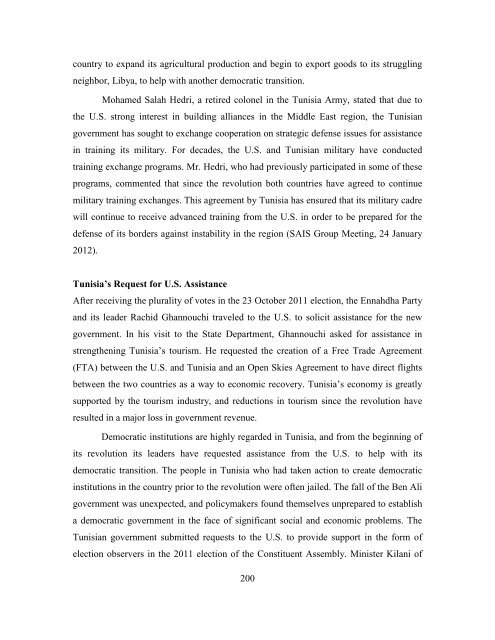Tunisia: Understanding Conflict 2012 - Johns Hopkins School of ...
Tunisia: Understanding Conflict 2012 - Johns Hopkins School of ...
Tunisia: Understanding Conflict 2012 - Johns Hopkins School of ...
Create successful ePaper yourself
Turn your PDF publications into a flip-book with our unique Google optimized e-Paper software.
country to expand its agricultural production and begin to export goods to its struggling<br />
neighbor, Libya, to help with another democratic transition.<br />
Mohamed Salah Hedri, a retired colonel in the <strong>Tunisia</strong> Army, stated that due to<br />
the U.S. strong interest in building alliances in the Middle East region, the <strong>Tunisia</strong>n<br />
government has sought to exchange cooperation on strategic defense issues for assistance<br />
in training its military. For decades, the U.S. and <strong>Tunisia</strong>n military have conducted<br />
training exchange programs. Mr. Hedri, who had previously participated in some <strong>of</strong> these<br />
programs, commented that since the revolution both countries have agreed to continue<br />
military training exchanges. This agreement by <strong>Tunisia</strong> has ensured that its military cadre<br />
will continue to receive advanced training from the U.S. in order to be prepared for the<br />
defense <strong>of</strong> its borders against instability in the region (SAIS Group Meeting, 24 January<br />
<strong>2012</strong>).<br />
<strong>Tunisia</strong>’s Request for U.S. Assistance<br />
After receiving the plurality <strong>of</strong> votes in the 23 October 2011 election, the Ennahdha Party<br />
and its leader Rachid Ghannouchi traveled to the U.S. to solicit assistance for the new<br />
government. In his visit to the State Department, Ghannouchi asked for assistance in<br />
strengthening <strong>Tunisia</strong>’s tourism. He requested the creation <strong>of</strong> a Free Trade Agreement<br />
(FTA) between the U.S. and <strong>Tunisia</strong> and an Open Skies Agreement to have direct flights<br />
between the two countries as a way to economic recovery. <strong>Tunisia</strong>’s economy is greatly<br />
supported by the tourism industry, and reductions in tourism since the revolution have<br />
resulted in a major loss in government revenue.<br />
Democratic institutions are highly regarded in <strong>Tunisia</strong>, and from the beginning <strong>of</strong><br />
its revolution its leaders have requested assistance from the U.S. to help with its<br />
democratic transition. The people in <strong>Tunisia</strong> who had taken action to create democratic<br />
institutions in the country prior to the revolution were <strong>of</strong>ten jailed. The fall <strong>of</strong> the Ben Ali<br />
government was unexpected, and policymakers found themselves unprepared to establish<br />
a democratic government in the face <strong>of</strong> significant social and economic problems. The<br />
<strong>Tunisia</strong>n government submitted requests to the U.S. to provide support in the form <strong>of</strong><br />
election observers in the 2011 election <strong>of</strong> the Constituent Assembly. Minister Kilani <strong>of</strong><br />
200
















